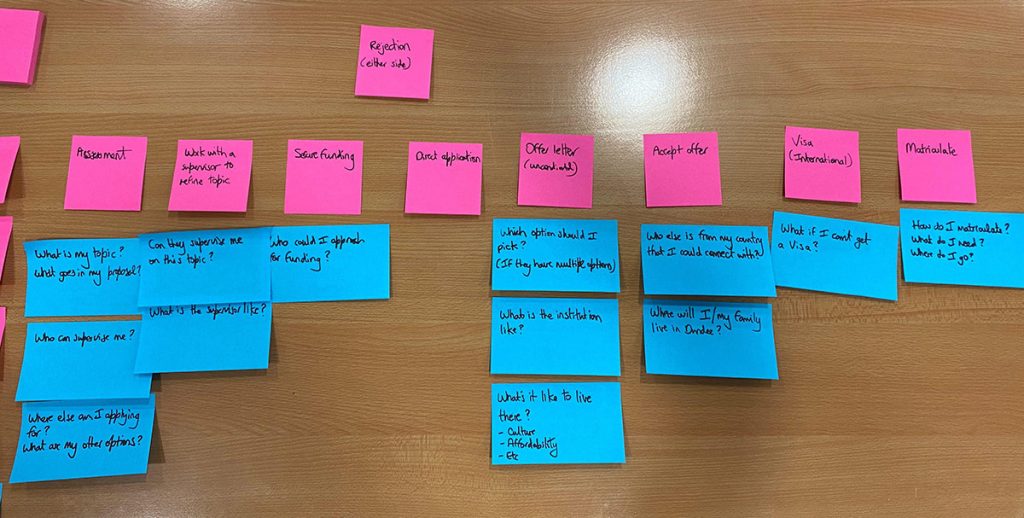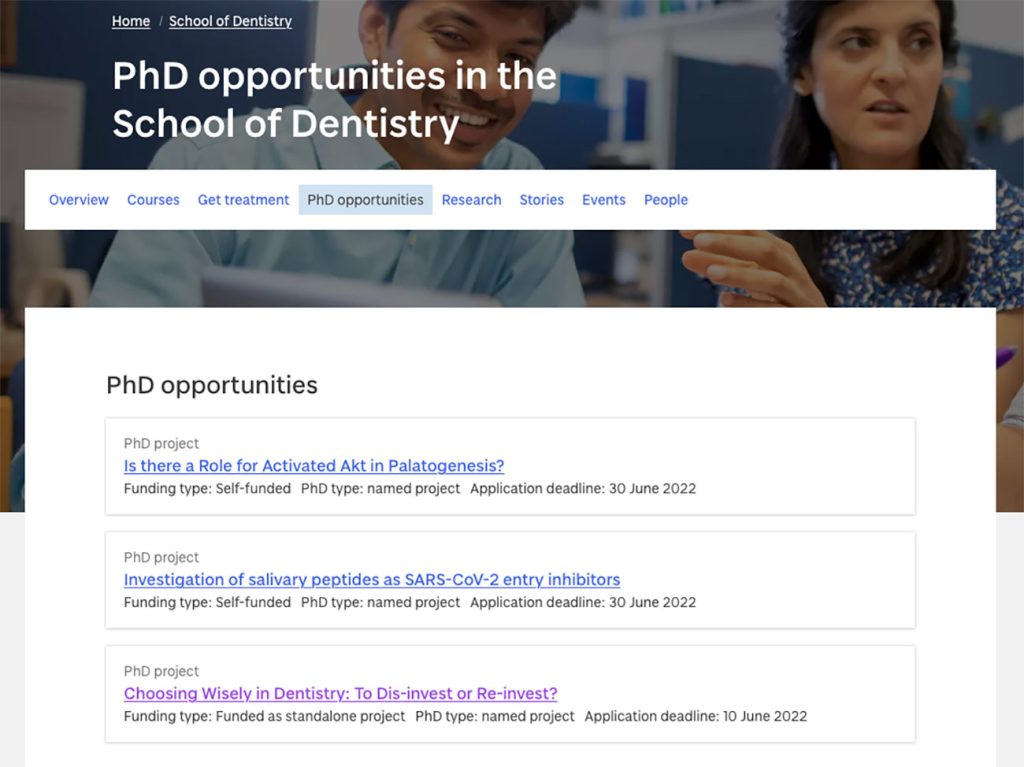In May 2022 Web Services successfully launched the new PhD web pages. This marks a huge milestone and is the culmination of work that we started two years ago when we consulted with students and stakeholders around the requirements for the project. Prior to this we faced some limitations and challenges in publishing PhD opportunities.
No single source of truth
In our legacy content management system (t4), PhD content was published on School and department web pages, however there was no single location where prospective applicants could view a complete listing of our PhD project opportunities. This meant that someone looking at a PhD project on a department web page might miss another relevant opportunity on a different part of the website.
Lack of structure and purpose
Previously, PhD content wasn’t structured in any meaningful way. When content is structured, we break it up into chunks via fields, allowing it to be reused easily through automated publishing. This means that content can work harder and can be served to users at the right point and in the right format in their journey. An added bonus of this approach is that Google loves when you give content structure and purpose, and this can help your search rankings. Unfortunately, content on our old PhD pages had little or no structure and so was effectively locked in a silo.
Moving to a better way of managing PhD content
Engaging with subject matter experts and students, we set out to get a better understanding of the user journey for a prospective PhD student. Essentially, there are three ways that someone might apply to undertake a PhD with the University:
- They might approach an academic or PhD lead within one of our Schools with their own original idea for a PhD project.
- They might apply to a predefined project. This means that the topic is set, it is associated with a defined supervisor and sometimes comes with funding.
- They can apply to one of our structured PhD programmes which can incorporate training, opportunities to study pre-defined projects, and often include funding.

Projects and programmes
The primary focus of the project was around pre-defined PhD projects and also PhD programmes. Evidently there is a relationship between these. For example a programme such as the SLS PhD Programme or the Scottish Graduate School for the Arts and Humanities can host a range of projects. Keeping this in mind, we were keen to develop a solution that provided different routes into this information for the user.
Funding
Funding availability varies across different PhD opportunities. Some pre-defined projects and often those associated with PhD programmes come with funding. This can often be restricted by country, for example, PhDs studied via the China Scholarship Programme are restricted to Chinese students.
If funding isn’t available then PhD opportunities are generally defined as being ‘self-funded’, ie the applicant will need to pay fees and any other associated costs.
Taking this into account, it was obvious that allowing prospective applicants to filter PhD opportunities by funding availability was going to be useful in helping in their decision making.

Research areas
Our investigations showed that PhD topics frequently span multiple research areas. We began to develop an extensive taxonomy that would allow us to ‘tag’ opportunities with one or more research area. This demonstrates the interdisciplinary nature of PhDs and, importantly, also provides prospective students with an alternative route into the content that hopefully matches their mental model. From ‘acoustics’ to ‘virology’, the end result is a research area taxonomy containing well over 100 terms.
Promoting PhD opportunities on people pages
We learned that students considering a PhD often search first for the name of an academic. They’re perhaps aware that the person is a recognised expert in a field related to their proposed PhD topic. This search invariably leads them to a staff profile page on the University website. We decided to maximise the value of this journey to the user by automatically displaying current PhD projects on staff profiles if an academic is identified as a PhD project supervisor.

Search visibility
Helping users search for content easily has been one of the main drivers behind the University website transformation project and PhDs are no different in this respect. All PhD projects and programmes can be searched and filtered via the main UoD website search or via the dedicated sections at the following links.
Automated publishing
Through the magic of connected content and automated publishing, PhD opportunities can also be published from a single source to multiple locations.
For example, a project titled ‘Early emotions and concepts about nature arising from play in outdoor settings’ might overlap at least two disciplines – education and psychology. Previously, this content would have been manually duplicated across our School of Education and Social Work and Psychology web pages. Now we can automatically publish a summarised version of this content on these pages with links to a central source for the full detail.
This makes our publishing model more efficient and gives us confidence that our content is up to date and accurate.

PhD programmes
Our new PhD programmes section brings together structured doctoral training programmes in addition to our established PhD studentships which offer regular funded PhD project opportunities.
Postgraduate research
PhDs are just one part of our provision relating to postgraduate research. We also took the opportunity to refresh our PGR web pages including clearer descriptions for our various types of research degree, improved signposting for related support such as the Doctoral Academy, and dedicated pages for our Doctoral Training Programmes.
We’ll monitor the performance of PhD pages in the coming months and continue to refine and improve these as we gather feedback from users.
